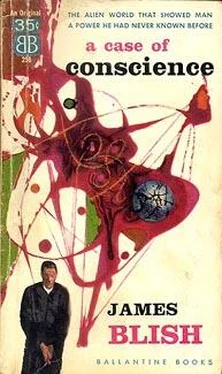The caller was the UN man. His face was very strange underneath his funny hat, and his head was cocked as if to catch the first word. Suddenly, blindingly, Ruiz-Sanchez saw the hat in the light of the attitude, and realized what it was: an elaborately disguised hearing aid. The UN man was deaf and, like most deaf people, ashamed of it. The rest of the apparatus was a decoy.
“Dr. Michelis, Dr. Meid, Dr. Ruiz,” he said. “I don't know how to begin. Yes, I do. My deepest apologies for past rudeness. And past damn foolishness. We were wrong — my God, but we were wrong. It's your turn now. We need you badly, if you feel like doing us a favor. I won't blame you if you don't.”
“No threats?” Michelis said, with unforgiving contempt.
“No, no threats. My apologies, please. No, this is purely a favor, requested by the Security Council.” His face twisted suddenly, and then was composed once more. “I volunteered to present the petition. We need you all, right away, on the Moon.”
“On the Moon! Why?”
“We've found Egtverchi.”
“Impossible,” Ruiz-Sanchez said, more sharply than he had intended. “He could never have gotten passage. Is he dead?”
“No, he's not dead. And he's not on the Moon, I didn't mean to imply that.”
“Then where is he, in God's name?”
“He's on his way back to Lithia.”
The trip to the Moon, by ferry-rocket, was rough, hectic and long. As the sole space voyage now being made in which the Haertel overdrive could not be used — across so short a distance, a Haertel ship would have overshot the target — very little improvement in techniques had been made in the trip since the old von Braun days. It was only after they had been bundled off the rocket into the moonboat, for the slow, paddle-wheel-driven trip across the seas of dust to the Comte d'Averoigne's observatory, that Ruiz-Sanchez managed to piece the whole story together.
Egtverchi had been found aboard the vessel that was shipping the final installment of equipment to Cleaver, when the ship was two days out. He was half-dead. In a final, desperate improvisation, he had had himself crated, addressed to Cleaver, marked “FRAGILE — RADIOACTIVE — THIS END UP,” and shipped via ordinary express into the spaceport. Even a normally raised Lithian would have been shaken up by this kind of treatment, and Egtverchi, in addition to being a spindling specimen of his race, had been on the run for many hours before being shipped.
The vessel, by no very great coincidence, was also carrying the pilot model of the Petard CirCon; the captain got the news back to the count on the first test, and the count passed it along to the UN by ordinary radio. Egtverchi was in irons now, but he was well and cheerful. Since it was impossible for the ship to turn back, the UN was now, in effect, doing his running for him, at a good many times the speed of light.
Ruiz-Sanchez found a trace of pity in his heart for the born exile, harried now like a wild animal, penned behind bars, on his way back to a fatherland for which no experience in his life had fitted him, whose very language he could not speak. But when the UN man began to question them all — what was needed was some knowledgeable estimate of what Egtverchi might do next — his pity did not survive his speculations. It was right and proper to pity children, but Ruiz-Sanchez was beginning to believe that adults generally deserve any misfortune that they get.
The impact of a creature like Egtverchi on the stable society of Lithia would be explosive. On Earth, at least, he had been a freak; on Lithia, he would soon be taken for another Lithian, however odd. And Earth had had centuries of experience with deranged and displaced messiahs like Egtverchi; such a thing had never happened before on Lithia. Egtverchi would infect that garden down to the roots, and remake it in his own image — transforming the planet into that hypothetical dangerous enemy against whose advent Cleaver had wanted to make it an arsenal!
Yet something like that had happened when Earth was a stable garden, too. Perhaps — O felix culpa! — it always happened that way, on every world.
Perhaps the Tree of the Knowledge of Good and Evil was like the Yggdrasil of the legends of Pope Hadrian's birthland, with its roots in the floor of the universe, its branches bearing the planets — and whosoever would eat of its fruit might eat thereof…
No, that must not be. Lithia as a rigged Garden had been dangerous enough; but Lithia transformed into a planet-wide fortress of Dis was a threat to Heaven itself.
The Count d'Averoigne's main observatory had been built by the UN, to his specifications, approximately in the center of the crater Stadius, a once towering cup which early in its history had been swamped and partially melted in the outpouring sea of lava which made the Mare-Imbrium. What remained of its walls served the count's staff as a meteor — rampart during showers, yet they were low enough to be well below the horizon from the center of the crater, giving the count what was effectively a level plain in all directions. He looked no different than he had when they had first met, except that he was wearing brown coveralls instead of a brown suit, but he seemed glad to see them. Ruiz-Sanchez suspected that he was sometimes lonely, or perhaps lonely all the time — not only because of his current isolation on the Moon, but in his continuing remoteness from his family and indeed the whole of ordinary humanity.
“I have a surprise for you,” he told them. “We've just completed the new telescope — six hundred feet in diameter, all of sodium foil, perched on top of Mount Piton a few hundred miles north of here. The relay cables were brought through to Stadius yesterday, and I was up all night testing my circuits. They have been made a little neater since you last saw them.” This was an understatement. The breadboard rigs had vanished entirely; the object the count was indicating now was nothing but a black enamel box about the size of a tape recorder, and with only about that many knobs.
“Of course to do this is simpler than picking up a broadcast from a transmitter that doesn't have CirCon, like the Tree,” the count admitted. “But the results are just as gratifying. Regard.” He snapped a switch dramatically. On a large screen on the opposite wall of the dark observatory chamber, a cloud-wrapped planet swam placidly.
“My God!” Michelis said in a choked voice. “That's — is that Lithia, Count d'Averoigne? I'd swear it is.”
“Please,” the count said. “Here I'm Dr. Petard. But yes, that's Lithia; its sun is visible from the Moon a little over twelve days of the month. It's fifty light-years away, but here we see it at an apparent distance of a quarter of a million miles, give or take ten thousand — about the distance of the Moon from the Earth. It's remarkable how much light you can gather with a six-hundred-foot paraboloid of sodium when there's no atmosphere in the way. Of course with an atmosphere we couldn't maintain the foil, either — the gravity here is almost too much for it.”
“It's stunning,” Liu murmured.
“That's only the beginning, Dr. Meid. We have spanned not only the space, but also the time — both together, as is only appropriate. What we are seeing is Lithia today — right now, in fact — not Lithia fifty years ago.”
“Congratulations,” Michelis said, his voice hushed. “Of course the scholium was the real achievement — but you threw up an installation in record time, too, it seems to me.”
“It seems that way to me, too,” the count said, taking his cigar out of his mouth and regarding it complacently. “Are we going to be able to catch the ship's landing?” the UN man said intensely.
“No, I'm afraid not, unless I have my dates wrong. According to the schedule you gave me, the landing was supposed to have taken place yesterday, and I can't back my device up and down the time spectrum. The equations nail it to simultaneity, and simultaniety is what I get — neither more, nor less.”
Читать дальше











